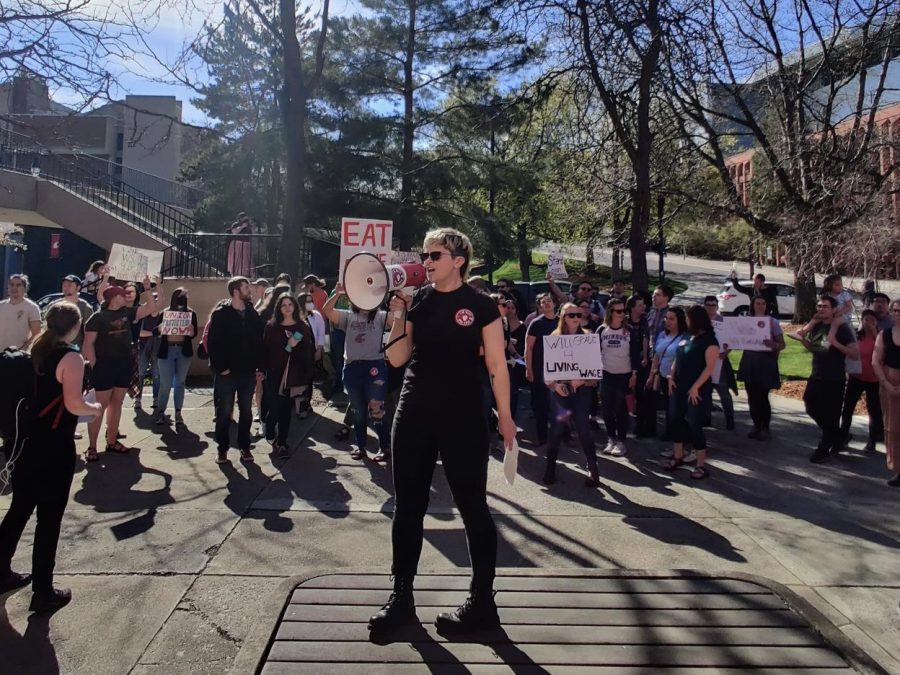Academic student employees achieve unionization
WSU-CASE moves forward in bargaining process, aims to elect bargaining committee this month
Academic student employees rally at WSU Pullman, preparing to file their petition to unionize, May 4.
November 10, 2022
Academic student employees officially unionized Wednesday, following six months of rallies, healthcare issues and delay tactics.
“I feel like there’s been some pushback about a union [from the administration] like, ‘why does this need to happen?’ but it’s a reflection of just how [much] this is needed,” said Aurora Brinkman, doctoral candidate in clinical psychology. “ASEs at WSU have been advocating for these changes for a long time, and we haven’t seen them happen.”
When she heard about the union’s interim certification, Brinkman “screamed a little bit” and began to jump up and down. She felt a sense of relief and validation, knowing the WSU Coalition of Academic Student Employees was on the right path to making concrete changes at WSU, she said.
ASEs’ last attempt to unionize at WSU was 14 years ago. Misinformation about the union replacing the Graduate and Professional Student Association and being established without a majority vote divided students on the topic of unionization, according to the WSU-CASE website.
“That was before my time – 2008. I think I was in elementary school, maybe middle school,” Brinkman said.
Although unionization in the past did not come to fruition at WSU, current ASEs are excited to make their mark on the university, establishing the foundation of a union that incoming graduate students can build upon, said Carla De Lira, doctoral student in computer science.
The union will also allow ASEs to have the legal standing to negotiate with WSU and safely bring their concerns to the bargaining table, she said.
In fall 2022, ASEs are still concerned with pay and healthcare issues. De Lira said about 40% of people who use the Cougar Food Pantry, which was only established in August 2021, are graduate students. This may be a direct effect of low stipends, regardless of a 2.5% increase in graduate students’ pay this year.
“We don’t pursue the degree thinking that we’d be suffering from the results of a lower stipend or not great healthcare or experiencing discrimination or harassment,” she said. “We come into grad school to learn and get an education and then be able to be respected and have a dignified experience in our working conditions.”
Despite low stipends, ASEs are expected to pay out-of-pocket for lab work, specialists and more outside of Cougar Health Services. Brinkman said she received a “huge bill” from a specialist this month, and CHS told her 80% of it would be covered because the specialist is in-network. The bill was not covered.
“[It’s] really stressful because it’s a large bill – it’s like a tenth of what I make in a year – and that’s just from like one appointment to see a specialist,” she said.
Taking time to call the specialist’s office and insurance has taken up several hours she “does not have,” affecting her clinical work and grading. With a union, Brinkman hopes to bargain for education around rights, being paid more to cover healthcare costs beyond primary care and more resources to advocate for students in similar situations, she said.
Brinkman said WSU-CASE is hoping to elect members for a bargaining committee, which will research areas like healthcare and fee waivers, by the end of the month.
Once WSU administration and the committee reach an agreement on bargaining terms down the line, the committee will bring the terms back to ASEs for a vote. If the terms are approved, ASEs will go through the process to ratify the terms as their first bargaining contract. If the terms are rejected, they will return to the bargaining table with WSU for further conversation to reach a compromise, Brinkman said.
Based on past delays for WSU-CASE, it expects it may run into roadblocks in the ratification process, but ASEs hope it will not come to that, she said.
Before ASEs officially unionized, Brinkman said WSU provided only 85% of ASEs’ signatures to the state labor board, which were to verify a majority of students wanted to unionize. WSU received an extension of about two weeks to obtain the signatures, but Brinkman agreed there were many to include.
At least 50 WSU-CASE members from five WSU campuses signed and delivered a letter to administration on Oct. 28, requesting WSU provide the rest of the signatures or voluntarily recognize the union. WSU provided additional signatures within a day of the letter, she said.
Brinkman said direct actions like these serve to remind WSU that ASEs deeply care about these issues and will keep working toward them.
“It’s frustrating to keep pushing someone to do what is their job. I know a lot of these issues are things that administration care about and they are doing things to try to improve it, but we’re just not seeing the amount of action that there should be based on how important these issues are,” she said.
It was apparent years ago a union was needed, and it is exciting to see other universities around the nation celebrating unionizing as well, De Lira said.
The day WSU-CASE announced it had received a simple majority to form its union, Worchester Polytechnic Institute, which is also under the International Union of United Automobile, Aerospace and Agricultural Implement Workers of America, announced it unionized as well.
De Lira said it is a great time to be unionized, hearing in the media that people are collectively supporting the movement toward better working conditions.
“We’re unified. Establishing a majority shows that,” she said.
















